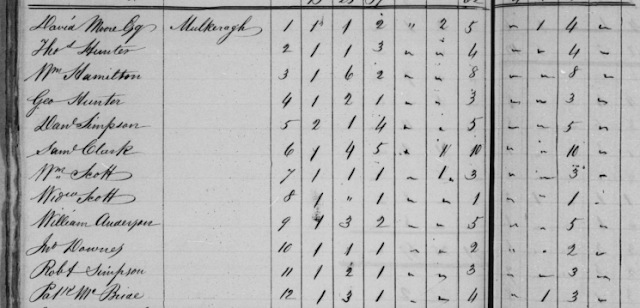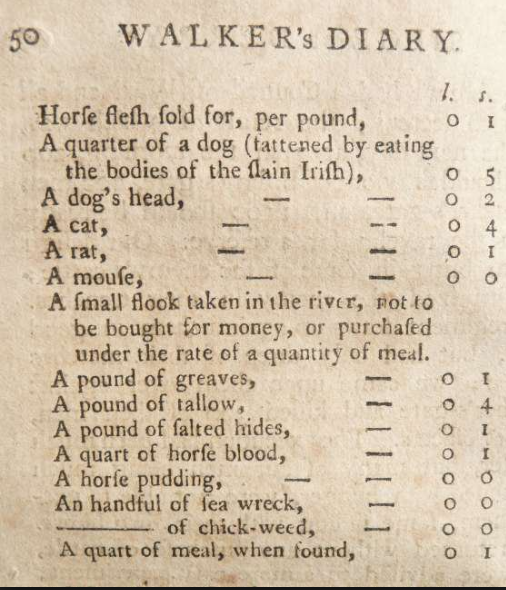Snippets from the Derry Journal
Local newspapers provide a rich font of information on regional history and give some insight into the daily lives of our ancestors. The Derry Journal was first published in 1772 and was first launched as the Londonderry and Donegal & Tyrone Advertiser. Below are a few snippets from the Derry Journal that are almost 200 years old and added commentary to give some context for the entries:
Derry Journal 23 Sept 1828
Newtown Limavady cattle show - The Kennaght Branch of the North-West Society 5 Sept 1828: Prizes awarded - To farming servants for long and faithful service - first premium was awarded to Patrick McBride who has served under Mr William Scott of Mulkeeragh for 37 years; 2nd premium to David McKee who served Mr William Patton for 26 years.
Note - many prize winners were listed in the article, many familiar names of local farmers all members of the Kennaght Branch of the NW Society. What is interesting here is the naming of farm servants - normally people who would not appear in local newspapers or in estate records since they were landless. It is fortunate that a transcript of the 1831 census (made in 1834) survives for Co. Derry but this census only named the head of household. I was able to locate Patrick McBride in Mulkeeragh - he had been a farm servant for William Scott since 1791.
Mulkeeragh 1831 census
House number 7 was Wm Scott with one male and one female member of the house present - in addition they had a female servant. In house No 12 was his farm servant Pat'k McBride with three males and one female in the household. Both families were Presbyterian.
Locating David McKee was more problematic since his employer William Patton was not given an adderess but it seemed likely that he was one of the Pattons of Myroe. William Patton senior and junior can both be found in Culmore in the 1831 census. David McKee can be located in Crindle townland, which is contiguous with Culmore, in house number 26 with a household containing 5 males and 1 female all belonging to the Established Church of Ireland.
Derry Journal 7 April 1829
Died Dungiven Tues 31st ulst at an advanced age of 90 years, Mr Cornelius McDougal - highly esteemed (c1739-1829).
Note - His name does not appear in the 1766 religious returns for the parish of Dungiven but there is a Billy McDuggall listed and this is probably his father. The will of Cornelius McDougal was probated in the Prerogative Court in 1829. Possibly it was his grandson Mr Cornelius McDougal Kyle whose death announcement appeared in the LD Sentinel on 13 Sept 1834 - Kyle – On the 30th ult., at his residence at Dungiven, Mr. Cornelius McDougal Kyle, aged 26 years (c1808-1834).
Derry Journal 22 Dec 1829
At the infirmary on Sat 9th inst Jane Donnel aged 106 years. When a girl of 15 years she crosses the River Foyle on the ice in 1739 (the great frost, which continued for 3 months) from Glendermott where she had purchased a wheel, which was the commission of her journey to America in 1800 from where she returned in 1807 with the same wheel being all her furniture and in consequence of a fall in 1808, she became an invalid and was admitted to the infirmary where she has occassionally been an inmate up to the time of her death - she possessed all her faculties to the period of her dissolution.
Note: On the last day of 1739, Ireland awoke to find itself in the grip of an Arctic winter like no other - lakes and rivers froze, thousands died in the aftermath of what was a mini ice-age. Initially, locals revelled in the novelty with dances, festivals and even sheep-roastings held on the ice but famine ensued 1740-1741 leaving thousands dead from starvation and cold. Jane Donnell was one of the lucky ones who crossed the icy Foyle safely. Six were drowned trying to cross the frozen Foyle in January 1740 (Dublin Evening Post 19-22 Jan 1739/40). The long dry Summer of 1741 led to an outbreak of fires in many of Ireland's towns. 'Fire in Omagh razed almost the whole town to the ground leaving little more that a church, a gaol and the court-house standing' (D. Dickson, Arctic Ireland: The extraordinary story of the Great Frost and Forgotten Famine of 1740-41; Dundonald, 1997, p. 57). Jane Donnell (c1723-1829) survived the Great Frost and Famine and the viccisitudes of political turmoil in Ireland, the 1798 rebellion and the Act of Union 1800.
Derry Journal 16 Feb 1830
On Saturday week aged 26 years of the small-pox although vaccinated in his youth James the eldest son of Mr Thomas Gelston, merchant of Portaferry
Note - Shipbuilding was a major industry Portaferry in the 1800s. The main shipbuilders were the Conways, the McCleerys and Thomas Gelston. Between 1812 and 1822 over thirty vessels were built in Portaferry, a third of them by Thomas Gelston in his shipyard close by the castle.
Derry Journal 15 June 1830
Died at Ballynagard on the 5th inst Catherine Duffy aged 110 years - she retained her faculties until a few months before her death. She spent the greater part of her life in the service of the Hart family.
Catherine Duffy had a putative lifespan c1720-1830 but there was no way of verifying her age in the absence of birth registration, which only began in Ireland in 1864. It is reported that she was a servant of the Hart family - the main family seat was at Kilderry at Muff. The Harts had another house and demesne in Ballynagard, Co Derry (Ballynagard is 1.6 miles from Muff). Presumably, Catherine Duffy worked under Lt-Gen George Vaughan Hart (M.P) who was born 1752 and died 1832 in Creeslough, Co Donegal (buried in Muff churchyard - Tablet in Muff Church - Gov of Culmore and Londonderry, son of Rev Edward Hart, rector of Desertegny, 1765-1793, and Elizabeth Ramsay).




Comments
Post a Comment